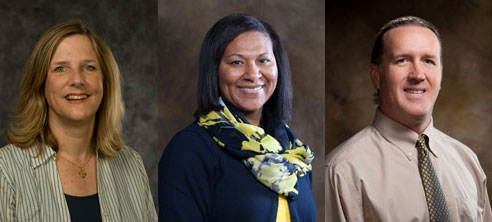FAYETTEVILLE, Ark. – A recent ranking of scholarly productivity provides clear evidence that the University of Arkansas’ rehabilitation counseling program is a leader in its field.
Researchers recently published their findings that the College of Education and Health Professions academic program ranked eighth in the nation when they looked at the number of research articles published by faculty in peer-reviewed publications.
The prestige of academic programs is assessed by faculty research and productivity, according to an article published last month in Rehabilitation Counseling Bulletin. The researchers reviewed seven such publications in the years 2000-2009.
“Our rehabilitation counseling program has consistently produced high-quality research that it shares in these publications, and it produces high-quality graduates who are leaders in teaching and serving people with disabilities,” said Tom Smith, dean of the College of Education and Health Professions. “We’re excited to see what the future holds as this program continues the important work of ensuring that people with disabilities have opportunities to work and live as independently as possible.”
The rehabilitation counseling program at Arkansas has experienced changes in recent years with the retirement of Richard T. Roessler, a teacher, author and researcher considered by many to be a giant in the field. He co-authored the textbook used by academic programs around the country in their introductory rehabilitation courses and won two national awards before his retirement in 2010.
The program has also changed to boast a more diverse faculty that includes two women, one of whom is an African American, and two who have physical disabilities.
“Now, leadership roles in our field are being taken on by people with disabilities and people of different ethnic backgrounds,” said Lynn Koch, professor of rehabilitation education and research. “Often, these people have a better understanding of the challenges faced by people with disabilities because their background gives them more natural empathy.”
It remains a small program with three faculty members, but it has widened its collaboration with other academic programs in ways that serve both students and faculty.
Brent T. Williams, coordinator of the program and associate professor, co-wrote a book with U of A faculty members in architecture and interior design that outlined the concept of universal design to encourage construction of buildings accessible to everyone.
“It’s really nice to work hard to get people training and skills required for jobs but if you can’t get them into the building, I’m not sure what good you’re doing,” Williams said.
Koch received a $500,000 federal grant in 2010 with Kristin Higgins, an associate professor of counselor education, to prepare students to work as psychiatric vocational rehabilitation specialists. Counselor education is another academic program in the College of Education and Health Professions. The award Koch and Higgins received paid tuition, fees and stipends for 25 master’s students.
Williams currently holds $1.5 million in federal training grants that provide similar tuition and stipends to students who receive training to be general rehabilitation counselors.
The program has also expanded its focus beyond the traditional vocational rehabilitation track. Koch’s research explores psychological aspects of disability, and Stephanie Lusk, the newest member of the faculty, concentrates on substance abuse and issues facing families affected by it. Lusk also shares Koch’s passion for studying and teaching about mental health issues.
The program’s strong emphasis on research is aided by the college’s faculty in the educational statistics and research methods, Koch said. Rehabilitation counseling students take 15 to 18 hours of statistics courses before graduating, and the statistics faculty members sit on dissertation committees in rehabilitation.
“Our success is about the success of the entire college,” Koch said. “And, we also collaborate with faculty at other universities.”
The graduate students in the program represent diversity of backgrounds, ethnicities and professional interests. Most have direct or family experience with disabilities, Williams said.
“There is a strong tie between poverty and disabilities,” he said. “Disabilities are more prevalent in marginalized populations. If you don’t have people in these groups represented in the service sector, you’re probably going to have problems connecting with them.”
The program’s alumni also illustrate its success. They teach at leading rehabilitation counseling programs at other institutions and are practitioners in leadership roles at human-service agencies.
Phillip Rumrill, who earned his doctorate in rehabilitation counseling at Arkansas in 1993, coordinates the rehabilitation counseling program and directs the Center for Disability Studies at Kent State University in Ohio. He is also the founding director of the Multiple Sclerosis Employment Assistance Service, and the College of Education and Health Professions selected him as the winner of its Outstanding Alumni Award in Health and Human Services in 2011.
The rehabilitation program has been ranked in the top 20 of graduate rehabilitation programs nationally by U.S. News & World Report for more than a decade. It’s currently at No. 16. The article in Rehabilitation Counseling Bulletin found a positive correlation between research productivity of an institution and its U.S. News ranking.
Topics
Contacts
Brent T. Williams, associate professor of rehabilitation education an
College of Education and Health Professions
479-575-8696,
Lynn Koch, professor of rehabilitation education and research
College of Education and Health Professions
479-575-5824,
Heidi Wells, content writer and strategist
Global Campus
479-879-8760,
